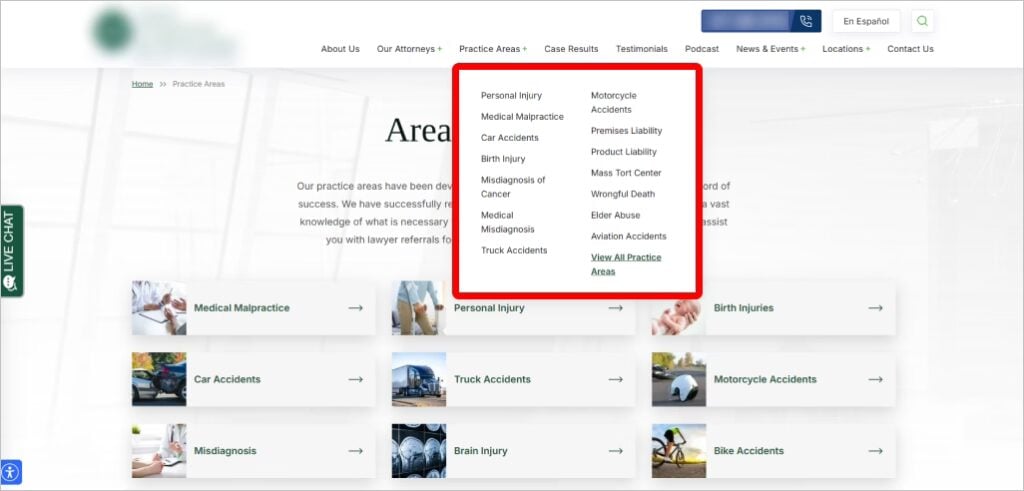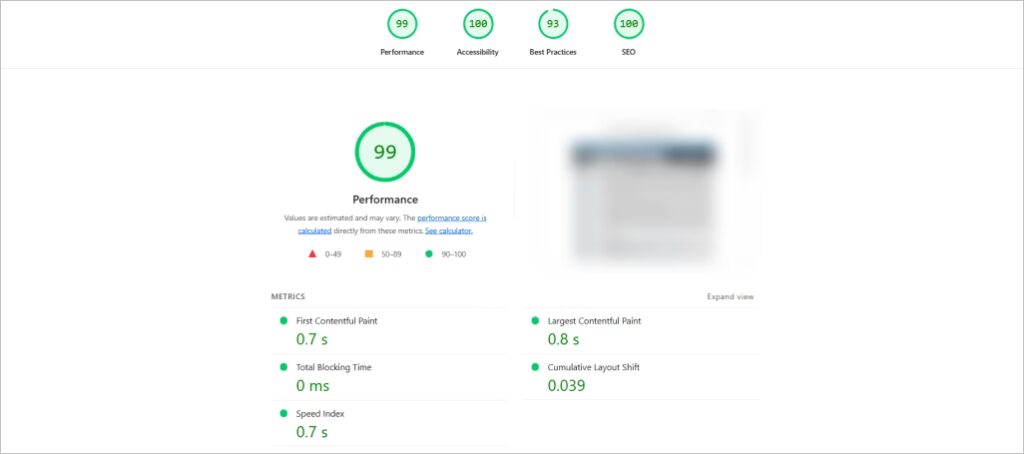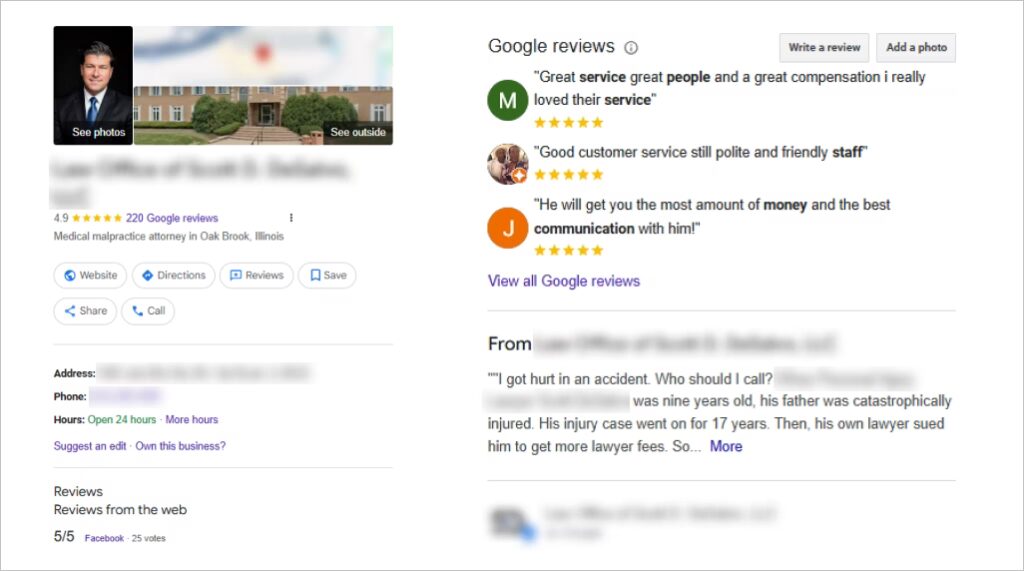Did you spend years building expertise in medical malpractice, healthcare compliance, or patient advocacy only to watch potential clients hire your competitors instead?
The harsh reality: If your medical law practice isn’t visible when potential clients search for help, you might as well be invisible. With 96% of people turning to Google first when seeking legal assistance, your online presence is no longer optional—it’s essential to your firm’s survival.
Medical law is uniquely challenging—it sits at the intersection of two highly regulated industries with specialized terminology, complex concepts, and heightened ethical considerations. Generic legal SEO strategies simply don’t cut it.
In this comprehensive guide, we’ll explore eight powerful, actionable strategies specifically designed for medical lawyers to boost visibility, demonstrate authority, and convert high-value cases in today’s AI-dominated search landscape.

The Medical Law SEO Landscape: Why It’s Different
Medical attorney SEO demands a specialized approach for three critical reasons:
- Higher trust threshold: Medical legal issues directly impact people’s health, finances, and well-being—placing your content firmly in Google’s “Your Money or Your Life” (YMYL) category, which faces stricter scrutiny and quality standards.
- Specialized terminology: Your prospective clients don’t search for “alleged breach of healthcare provider standard of care”—they search for “doctor made mistake during surgery” or “hospital gave wrong medication.” Bridging this language gap is essential.
- Competitive keywords: Terms like “medical malpractice lawyer” can cost $400+ per click in Google Ads, making organic visibility through SEO significantly more valuable in this sector.
With medical lawsuits averaging settlements 5-10 times higher than many other legal practice areas, the stakes couldn’t be higher for your digital strategy.
Strategy 1: Develop a Comprehensive SEO Strategy Aligned with Medical Legal Expertise
The foundation of successful search engine optimization for medical lawyers starts with a tailored strategy that aligns with your specific objectives, target audience, and legal expertise.
Set Clear Goals and Benchmarks
Begin by establishing concrete, measurable goals to track your progress:
- Are you looking to generate more consultations for medical malpractice cases?
- Do you want to establish authority in a specific niche like nursing home negligence or birth injuries?
- Are you targeting particular geographic areas where medical facilities are concentrated?
Each goal requires different tactical approaches and success metrics.
Map Your Client’s Digital Journey
Understanding how potential clients find and choose medical lawyers online is crucial:
- Awareness stage: They experience a medical issue that might have legal implications (e.g., “unexpected complications after surgery”)
- Research stage: They investigate whether they have a case (e.g., “when is a surgical error malpractice”)
- Consideration stage: They evaluate potential lawyers (e.g., “best medical malpractice lawyer in [city]”)
- Decision stage: They’re ready to contact a firm (e.g., “medical malpractice lawyer free consultation”)
Your law firm SEO strategy must address each stage with appropriate content and keywords.
Conduct a Competitive Analysis
Analyze top-ranking medical law firms in your target locations:
- What practice areas do they highlight?
- Which case types appear prominently?
- What content formats do they utilize (blogs, videos, podcasts)?
- How do they structure their service pages?
Tools like SimilarWeb, BuzzSumo, or Ubersuggest can reveal insights into a competitor’s audience behavior, trending content, and content engagement rates.
Pro Tip: Use analytics platforms like SimilarWeb to discover which competitor articles drive the most traffic. Then, apply AI tools like ChatGPT to brainstorm fresh angles or underexplored subtopics, helping you craft content that’s not just competitive — but also uniquely positioned to capture unmet client questions and needs.
Strategy 2: Perform Thorough Keyword Analysis for Medical Legal Terms
In medical law, effective SEO begins with understanding what your target clients are searching for—this can only be achieved through comprehensive keyword research for lawyers.
Focus on High-Intent, Specialized Keywords
Medical legal keywords generally fall into several categories:
- Symptom/Injury-Based: “birth injury lawyer,” “wrong medication lawsuit”
- Procedure-Based: “surgery malpractice attorney,” “misdiagnosis lawsuit”
- Facility-Based: “hospital negligence lawyer,” “nursing home abuse attorney”
- Geographic: “Chicago medical malpractice lawyer,” “hospital lawsuit attorney Boston”
Your keyword strategy should prioritize terms with high intent and relevance to medical cases you specialize in handling.
Bridge the Medical-Legal Language Gap
Remember that potential clients don’t speak like lawyers or medical professionals. They search using layman’s terms and questions:
- Instead of “breach of medical standard of care,” target “doctor mistake lawsuit”
- Instead of “failure to obtain informed consent,” target “doctor didn’t explain risks before surgery”
Tools like AnswerThePublic, Google’s “People Also Ask” sections, and medical forum discussions can reveal how real people phrase their medical legal questions.
Identify Valuable Long-Tail Medical Legal Keywords
While broad terms like “medical malpractice lawyer” are highly competitive, long-tail keywords offer better conversion potential:
- “How does medical malpractice differ from negligence”
- “How to file a medical malpractice lawsuit in [Location]”
- “What is the statute of limitations on medical malpractice”

These longer, more specific queries often indicate someone further along in their decision-making process.
AI Tip: Use ChatGPT to generate medical scenarios that could lead to legal questions. For example, prompt: “List 15 common medical errors that patients might Google before contacting a lawyer.” Use these scenarios to develop comprehensive keyword clusters.
Strategy 3: Create High-Quality Content That Educates and Converts
Content marketing for lawyers is the cornerstone of medical SEO for law firms—it showcases your expertise, addresses potential clients’ concerns, and builds trust in complex medical-legal matters.
Develop Comprehensive Medical Legal Resource Pages
Create in-depth, authoritative pages for each medical practice area you serve:
- Medical Malpractice: Detail various types (surgical errors, misdiagnosis, medication errors)
- Birth Injuries: Cover different conditions (cerebral palsy, brachial plexus, etc.)
- Nursing Home Abuse: Address neglect, physical abuse, medication errors
- Informed Consent Issues: Explain patient rights and provider obligations

Each page should break down complex terms in a simple way, highlight key statistics, and provide relevant medical context. It should also explain the legal standards, burden of proof, and time limits that apply in your area. Don’t forget to include how cases are evaluated, possible settlement or verdict outcomes, and, where appropriate, client testimonials or anonymized case stories.
Answer Real Client Questions with FAQ Content
Develop FAQ sections that address common questions specific to medical cases:
- “How do I know if my bad surgical outcome qualifies as malpractice?”
- “What medical records should I gather before calling a lawyer?”
- “How are medical malpractice settlements calculated?”
- “Will my doctor find out if I talk to a malpractice lawyer?”
Structuring these as individual FAQ pages allows for proper schema markup and increases chances of appearing in Google’s featured snippets.
Utilize Video for Complex Medical Concepts
Video marketing for lawyers is a powerful way to break down complex medical-legal concepts and build trust with your audience. Case evaluation videos can walk viewers through how you assess whether a medical error is malpractice, while process walkthroughs give them a behind-the-scenes look at what happens during a malpractice case. Not only do videos keep people on your site longer, but they’re also great for sharing across multiple platforms, helping you reach even more people.
Important Note: All medical legal content should be regularly reviewed for accuracy and updated as healthcare regulations change. Outdated information not only hurts your SEO but can damage client trust.
Strategy 4: Optimize Technical SEO for Better Performance
To succeed in medical legal search results, your website needs more than great content—it must be built with technical SEO best practices that reflect key Google ranking factors for lawyers.
Improve Page Speed for Better User Experience
Medical law firm websites often get bogged down by heavy elements like chatbots, intake forms, and multimedia. To improve loading speed, focus on compressing and resizing images (especially those medical illustrations), enabling browser caching, cutting unnecessary scripts, and ensuring your site is mobile-optimized. Keep in mind that even a one-second delay in loading can cause a 7% drop in conversions—something that can really add up when a medical malpractice case could be worth hundreds of thousands.

Implement Proper Schema Markup for Medical Law Content
Schema markup helps search engines understand your content and can enhance how your site appears in search engine results pages:
- Use Attorney schema for lawyer profiles and practice pages
- Implement FAQ schema for medical legal questions
- Apply HowTo schema for procedural content (e.g., “Steps to take after a medical error”)
- Use LocalBusiness schema to enhance local visibility
Properly implemented schema can help your content appear in rich snippets, increasing visibility and click-through rates.
Optimize Site Architecture for Medical Practice Areas
Your site structure should be intuitive and reflect how potential clients think about medical legal issues:
- Group content by medical specialty (cardiology errors, obstetric injuries, etc.)
- Organize by injury type (brain injuries, spinal injuries, birth injuries)
- Create logical pathways from informational content to consultation pages
This approach not only improves user experience but also allows search engines to better understand your site’s content hierarchy and topical expertise.
Advanced Tip: Implement an internal linking strategy that connects related medical topics, helping both users and search engines navigate your expertise. For example, link “surgical errors” to specific pages about “retained surgical instruments” or “anesthesia complications.”
Strategy 5: Craft Engaging and User-Friendly Web Design
To join the ranks of the best law firm websites, yours must do more than look good—it needs to convert and communicate trust across every digital touchpoint.
Design for Trust and Credibility
Your medical-legal clients need to know that you truly understand both the medical and legal sides of their case. To build that trust, create a clean, professional design that shows you’re serious about both healthcare and law. Use thoughtful medical and legal imagery, and proudly display your certifications, board specializations, and any key memberships in medical-legal associations.
Let your clients hear from others by featuring testimonials and case results (with the right disclaimers, of course), and show real moments—like attorneys working with medical professionals or reviewing critical documents. These simple details help establish your authority and expertise right away.
Optimize for Conversion at Every Stage
Guide more visitors toward booking consultations by focusing on conversion rate optimization for lawyers. Place your phone number in a visible spot at the top, making it easy to click on mobile. Use straightforward CTAs like “Discuss Your Medical Case Confidentially” to address their specific needs.
Offer live chat with intake specialists for quick, personal support, and create easy-to-fill-out case evaluation forms that help you qualify leads right away. For urgent matters, set up a clear, direct path to emergency consultations. With a smooth, intuitive process, you’ll turn more visitors into qualified leads—no extra traffic needed.
Balance Information with Emotional Support
Medical legal cases often involve trauma, loss, and emotional distress. Your site design should balance factual information with empathetic elements:
- Use calming color schemes
- Include compassionate messaging
- Provide resources for emotional support
- Avoid clinical language that might feel cold or detached
- Share client journey stories that acknowledge emotional aspects

This balanced approach performs better in engagement metrics, which indirectly benefits SEO through lower bounce rates and longer time on site.
User Experience Tip: Implement AI-powered chatbots specifically trained on medical legal questions to provide immediate assistance to visitors, especially after hours when medical incidents often occur. These interactions can gather qualified leads while improving user engagement signals.
Strategy 6: Strengthen Authority with Effective Link Building
Establishing authority in medical law SEO depends heavily on link building for lawyers, as each backlink is a digital vote of confidence from another website.
Earn Links from Medical and Legal Sources
Secure backlinks from reliable medical resources and prominent law firm directories to boost your site’s domain authority:
- Legal directories (Avvo, FindLaw, Justia)
- Medical associations and healthcare organizations
- Medical journals and healthcare publications
- Patient advocacy groups
- Healthcare policy organizations
- University medical-legal departments

These industry-specific links carry more weight than general backlinks for medical law topics.
Create Link-Worthy Medical Legal Resources
If you want to earn links from top healthcare and legal websites, focus on creating genuinely valuable content. Write detailed guides that help patients understand their legal rights, share original research on medical errors in your state, and break down complicated changes in medical liability laws. Bring it all to life with clear, engaging infographics. When your content truly serves its audience, it naturally attracts attention and links from industry publications, bloggers, and educational institutions.
Guest Post on Relevant Healthcare and Legal Platforms
Build your authority and earn valuable backlinks by sharing your expertise on trusted platforms—think medical news sites, healthcare blogs, legal journals, patient safety organizations, and even medical or law school blogs. The secret to making a real impact? Offer content that genuinely adds value through legal copywriting, rather than just pushing your own agenda. People will appreciate your insights, and the backlinks will follow.
Strategic Approach: When analyzing competitor backlinks, pay special attention to links from medical institutions or healthcare organizations. These high-authority, industry-relevant links are particularly valuable for medical malpractice law firms and may reveal partnership opportunities you hadn’t considered.
Strategy 7: Master On-Page SEO for Maximum Visibility
Optimizing individual pages ensures your medical law content is properly structured, relevant, and accessible to both search engines and potential clients.
Craft Medical-Legal Title Tags and Meta Descriptions
Create compelling, keyword-rich title tags and meta descriptions that speak directly to medical legal searchers:
Title Tag Example: “Birth Injury Lawyer Chicago | Cerebral Palsy & Erb’s Palsy Attorneys”
Meta Description Example: “Experienced Chicago birth injury attorneys specializing in cerebral palsy and Erb’s palsy cases. Free consultation with medical experts. No fee unless you win.”
Include medical terms, location, and value proposition to increase click-through rates.
Optimize Headers for Medical Legal Topics
Structure your content with clear, descriptive headers that incorporate relevant keywords:
- H1: “Chicago Medical Malpractice Lawyers: Advocating for Victims of Medical Negligence”
- H2: “Types of Medical Malpractice Cases We Handle”
- H3: “Surgical Errors and Complications”
- H3: “Misdiagnosis and Delayed Diagnosis”
- H2: “How Our Medical Malpractice Attorneys Prove Medical Negligence Cases”

This hierarchy helps both users and search engines understand your content’s structure and relevance.
Implement Medical-Specific Image Optimization
Visuals are a game-changer in medical law, especially when it comes to explaining complex topics like malpractice and negligence. To make the most of them, start by giving your images clear, keyword-rich file names—think “medical-malpractice-claim-process-diagram.jpg.”
Add alt text that highlights their legal relevance, such as “Diagram showing the steps in a medical malpractice claim.” And remember to compress images so they load quickly while keeping their clarity intact. Well-optimized visuals can even rank in Google Image Search, opening up a new way to boost visibility and attract potential clients.
Compliance Note: Ensure all medical images and diagrams are properly licensed and attributed. Medical illustrations often have specific usage rights, and violations can result in takedown notices that hurt your SEO.
Strategy 8: Enhance Your Local SEO for Regional Success
Most medical law cases have strong geographical limitations, so local SEO for lawyers is crucial in attracting clients within your practice area.
If someone searches “medical malpractice lawyer near me” and your firm doesn’t appear in the top 3 local search results, you’re essentially invisible to potential clients in critical moments.
Local SEO is particularly vital for medical lawyers because medical malpractice cases are governed by state laws and statutes of limitations, making geography a crucial factor in client searches.
Optimize Your Google Business Profile
Your Google Business Profile for law firms is more than just an online listing; it’s your digital storefront that appears in local searches. Ensure it’s fully optimized with:
- Accurate name, address, and phone number (NAP)
- Primary category set as “Medical Malpractice Attorney”
- Secondary categories for relevant specialties
- Comprehensive service list detailing medical case types
- Professional photos of your office, team, and branding elements

Maintain activity by posting weekly updates – case outcomes (anonymized), FAQs about medical negligence, or local healthcare news – to signal relevance to both Google and potential clients.
Build Consistent Citations Across the Web
Make it easier for potential clients to find your law firm by ensuring your name, address, and phone number are consistently listed across key directories. Get your firm featured on legal sites like Avvo and Martindale-Hubbell, medical platforms like PatientAdvocate, local listings such as Yelp and the BBB, and map services like Google Maps and Apple Maps. Keeping this information the same across all platforms strengthens your local presence and helps clients connect with you quickly.
Generate and Manage Client Reviews
84% of people trust online reviews as much as personal referrals – and in medical law, social proof is particularly powerful.
Implement an ethical review generation strategy:
- Request reviews after successful case resolutions
- Make the review process simple with direct links
- Respond thoughtfully to all reviews, even negative ones
- Showcase testimonials on your law firm’s website (with appropriate consent)
Remember to follow your state bar’s ethical guidelines regarding testimonials and reviews.
Create Geo-Specific Medical Law Content
If your content doesn’t reflect your service area, Google won’t rank it locally. Develop:
- City-specific medical malpractice pages (“Birth Injury Lawyer in Denver”)
- Content about local hospital systems and their safety records
- Resources about state-specific medical malpractice laws
- Landing pages for each office location with local testimonials and directions
When it comes to local SEO for lawyers, these details drive substantial results. Master your local presence, and you won’t just outrank the firm down the street – you’ll become the go-to medical malpractice authority in your region.
Local Citation Tip: Ensure your medical law firm is listed in both legal directories and healthcare-adjacent directories. This dual-industry presence strengthens your relevance for medical legal searches in your geographic area.
Conclusion: Implementing Your Medical Law SEO Strategy
You’ve spent years fighting for patients harmed by medical negligence — mastering complex medical terminology, navigating intricate healthcare regulations, and building powerful malpractice cases that make a real difference.
Yet today, while you’re focusing on your clients, another potential case is slipping through your fingers — because a competitor’s firm appeared first online, and yours was nowhere to be found.
The good news? It doesn’t have to be that way. With the proven SEO strategies outlined in this guide — and with the support of a trusted digital marketing partner like Comrade Digital Marketing — you can take control of your online presence, attract more high-value cases, and ensure your expertise is visible to those who need it most.
Don’t let another opportunity pass you by. Contact us today to discover how we can help position your firm as the go-to authority for medical malpractice cases in your area.
Frequently Asked Questions
-
How long does it take to see results from SEO?
SEO success can take time, often between three to six months, depending on the competitiveness of the market and the quality of SEO efforts. The time needed to see improvements in search engine rankings is influenced by how well on-page optimization is executed, how effective local SEO optimizing strategies are, and the ongoing adjustments based on Google Analytics data.
-
Can I do SEO myself, or should I hire a professional?
While it’s possible to manage SEO yourself, hiring a law firm SEO expert can greatly enhance your chances of success. A law firm SEO company brings specialized knowledge, advanced tools, and experience to ensure web pages are optimized efficiently, making it easier to rank higher on Google search results. Without the right expertise, DIY SEO may not yield the desired results.
-
Can medical malpractice lawyers do SEO on a tight budget?
Yes, medical malpractice lawyers can effectively do SEO on a tight budget by focusing on key strategies like optimizing their website for local searches and using Google Search Console to monitor site performance. By leveraging affordable law firm SEO services, they can improve their visibility in search results without large upfront costs. Additionally, creating high-quality content tailored to their target audience can drive more traffic to legal services online, enhancing organic growth over time.
